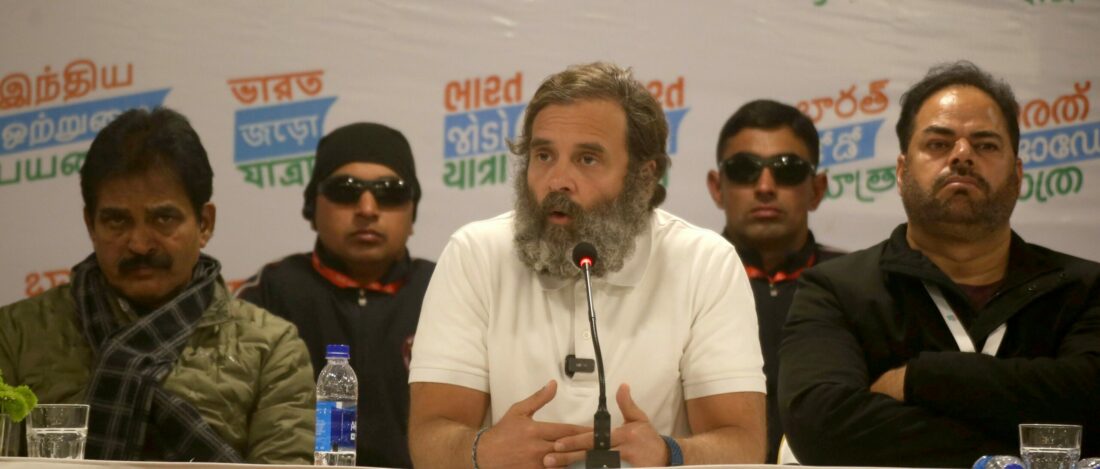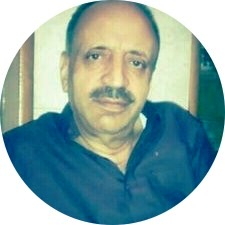by Altaf Hussain
It was interesting to see Rahul Gandhi publicly snubbing his senior party colleague and former Chief Minister, Digvijaya Singh, over the latter’s remarks about the surgical strike. Rahul called Digvijaya’s remarks ridiculous. He, thus, conveyed he was very much the leader of his party.
Rahul Gandhi never impressed me before. Nor did he impress several of his own party colleagues who clamoured for a leadership change in Congress. And hardly ever did he add to the electoral fortunes of his party. But now I guess Rahul has reinvented himself.
While in Jammu and Kashmir on the last leg of his Bharat Jodo Yatra (BJY), he came across as a confident and mature politician. However, I have my doubts as to whether his BJY was a success in the Valley.
No doubt quite a few thousand people came out, but I have seen and reported far too bigger crowds turning up for any local leader. Observers say that many of those who joined the yatra did so out of hatred for the BJP.
Tall claims of the Congress and its allies apart, ordinary Kashmiris were least excited about the yatra. They have bad memories of the Congress and have not forgotten that it was this party that diluted the erstwhile state’s special status before it was altogether removed by the BJP government. People also recall that it was the Congress government that hanged Afzal Guru out of turn for electoral gains. Rahul carried this baggage and failed to strike a chord with ordinary Kashmiris until his last day in Srinagar.
During his yatra, he made a commitment to restore Jammu and Kashmir’s “statehood and democracy”. But he never said he would undo the bifurcation of the state into two union territories. Likewise, though he quite often reiterated that Art 370 of the Indian constitution was abrogated in a wrongful manner, yet he did not make any promise that his party would undo this wrong and restore Jammu and Kashmir’s internal autonomy.
At every press conference in Jammu and Kashmir, Rahul avoided a direct answer to the oft-repeated question about Article 370. Every time, he said his position was the same as taken by the Congress working committee in its resolution in August 2019. That resolution, indeed, says the manner in which Article 370 was revoked was unconstitutional. But it does not go beyond that. The BJP always had abrogation of Article 370 in its election manifesto. There is no hint that Congress would make the restoration of this Article part of its own manifesto.
Displaying characteristics of a shrewd politician, Rahul was very tactful in avoiding straight answers to quite a few other questions. For instance, he was reminded that his great grandfather and first prime minister of India, Jawahar Lal Nehru, had while unfurling the tricolour at the same Lal Chowk in Srinagar more than 70 years ago, made some promises to the people of Kashmir. He was asked whether it pained him to realise that the promises had not been kept. He did not touch upon what Nehru had said or done; he said he would not look to the past and would, instead, look to the future.

But while Rahul may have offered nothing substantial to the people of Kashmir, he showed empathy with them, which was widely noticed. Addressing a public rally at Sheri Kashmir Stadium in Srinagar, he said that the people of Kashmir have suffered deep pain – the pain of losing their loved ones. He said he understood this pain because he himself had lost his father and before that his grandmother.
For the first time, an Indian leader acknowledged that the ordinary people of Kashmir had long been in pain. This a far cry from the Kashmir Files which even Pandit leaders like Sanjay Tikoo of the Kashmir Sangharsh Samiti say has demonised Muslims of Kashmir by misrepresentation of facts. The BJP govt promoted the film and celebrated it.
Rahul did not pour out his heart for any particular section of the people in Kashmir. He empathised with all. He also empathised with the families of Indian military and paramilitary soldiers who have lost their lives or faced risk to their lives.
His speech was received well by many in Kashmir. Its video is being forwarded on WhatsApp. A lady who watched it on TV, said “tears welled up in my eyes when Rahul spoke about his father.” Rahul recalled how he had been informed about his father’s and before that his grandmother’s assassination by phone. He said many Kashmiri families have received similar phone calls (about the killing of their loved ones). “These phone calls should stop. That is the goal of my yatra“, he said.
But despite appreciating his speech, Kashmiris have not pinned their hopes on Rahul or his party. As I said, he did not promise anything except the restoration of statehood and that too without clarifying whether Ladakh would be made part of the state again. Pertinent to mention, it was the Congress party that encouraged the agitation in Leh for union territory status way back in the late 1980s. That agitation was characterized by a social boycott of the Muslim minorities there.

Rahul said quite often that his BJY was the first and small step towards setting things right in India. He, however, did not say how he proposed to fight the politics of hate which has taken deep roots across India. And I wonder whether he has realised that the Congress party is much to blame for affording space to the BJP and its right-wing politics. After all, Congress compromised its own ideology on so many occasions and demolished democratic institutions besides failing to govern well.
Tailpiece
It was interesting to see Rahul Gandhi publicly snubbing his senior party colleague and former Chief Minister, Digvijaya Singh, over the latter’s remarks about the surgical strike. Rahul called Digvijaya’s remarks ridiculous. He, thus, conveyed he was very much the leader of his party.
(The author is a freelance journalist; formerly North India Correspondent of the BBC, he also worked with the Times of India. The opinions expressed in this article are those of the author and do not purport to reflect the opinions or views of Kashmir Life.)















